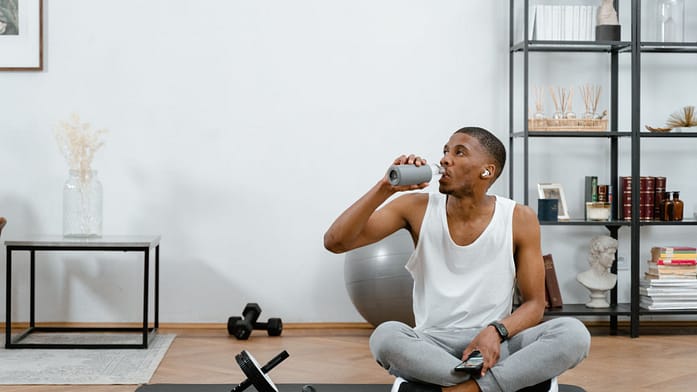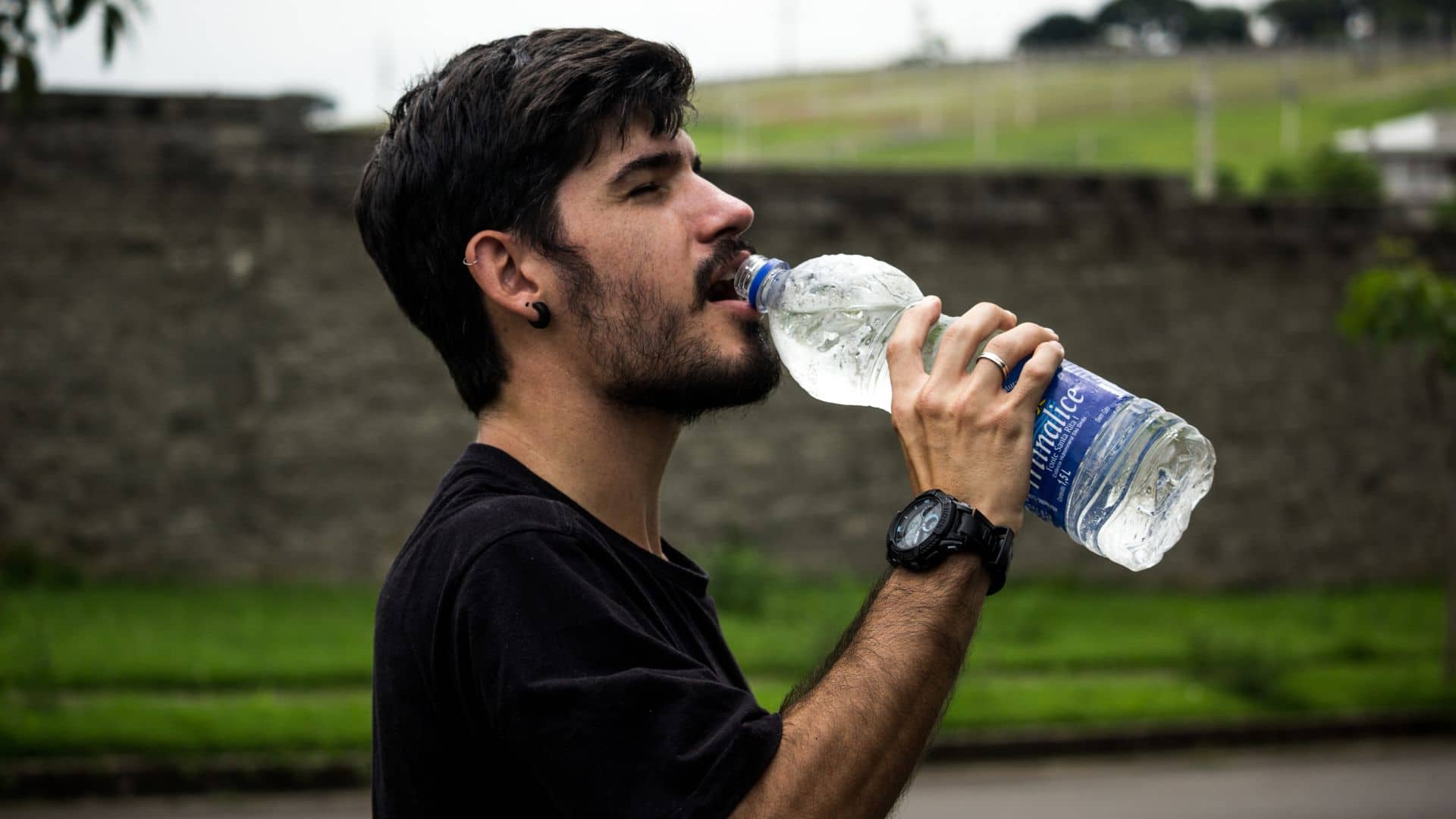Could drinking more water be the key to unlocking your inner strength and building up more power for your squats? Have you ever wondered if drinking more water could help you gain more power in your squats? Could increasing your water intake be the key to unlocking your squatting potential?
Drinking more water can potentially help you gain power when squatting. When you exercise, your body loses water through sweat and other bodily functions, which can lead to dehydration. Dehydration can cause fatigue, cramps, and decreased performance. By staying hydrated and consuming enough water, your body can function optimally and allow you to perform at your best during your squatting sessions. Proper hydration can help with muscle recovery and reduce the risk of injury. However, note that proper nutrition, rest, and correct form are also key factors in gaining power when squatting.
Yes, drinking more water can help you gain strength when squatting.
During exercise, your body generates heat and as a result, your body temperature rises. To cool down, your body sweats to release heat and maintain a safe temperature.
However, prolonged sweating can lead to dehydration, which can cause a reduction in blood volume, making it harder for your heart to pump blood to your muscles.
This can lead to fatigue, cramps, and decreased performance.
By staying hydrated and consuming enough water, your body can function optimally and allow you to perform at your best during your squatting sessions.
Water helps regulate body temperature, maintain blood volume, and deliver nutrients and oxygen to your muscles, all of which are important factors in maximizing your workout performance.
Dehydration can cause fatigue, cramps, and decreased performance.
Dehydration can cause a variety of negative effects on your body that can impact your performance during physical activity such as squatting.
When you are dehydrated, your body loses water and essential electrolytes, such as sodium and potassium, that are important for muscle function.
This loss of essential nutrients can cause fatigue and weakness, making it harder for you to complete your workout.
Dehydration can lead to muscle cramps, which can be painful and limit your range of motion during exercise.
Staying hydrated is crucial for maintaining optimal performance during physical activity, and dehydration should be avoided to prevent decreased performance and negative health effects.

Here is a chart table that outlines the symptoms of dehydration based on the percentage of fluid loss:
Percentage of fluid loss |
Symptoms |
|---|---|
| 1-2% | Thirst, mild discomfort |
| 3-5% | Dry mouth, increased heart rate, decreased urine output |
| 6-8% | Dizziness, fatigue, headache, muscle cramps |
| 9-11% | Difficulty concentrating, irritability, nausea |
| 12%+ | Delirium, unconsciousness, swollen tongue, sunken eyes |
As you can see from the chart, even a mild level of dehydration can lead to discomfort and decreased performance. It’s important to drink enough water before, during, and after exercise to stay properly hydrated and prevent dehydration.
Consuming enough water can help your body function optimally.
Staying hydrated and consuming enough water is crucial for optimal performance during squatting sessions.
When you are properly hydrated, your body is able to regulate its temperature, maintain blood volume, and deliver nutrients and oxygen to your muscles, which are all important factors in maximizing your workout performance.
Adequate hydration can also help prevent muscle cramps, fatigue, and weakness, which can negatively impact your ability to lift heavier weights and perform at your best.
It’s recommended to drink water before, during, and after your workout sessions to ensure that your body stays hydrated and can function at its best.
Here is a chart that provides a general guideline for how much water you should consume based on your body weight:
Body Weight |
Daily Water Intake |
|---|---|
| 100-120 lbs | 67-80 ounces |
| 121-150 lbs | 81-100 ounces |
| 151-180 lbs | 101-121 ounces |
| 181+ lbs | 122-147 ounces |
When exercising, it’s recommended to drink an additional 7-10 ounces of water for every 10-20 minutes of physical activity.
Therefore, if you are squatting for an hour, you should aim to drink about 21-40 ounces of water during your workout.
Additionally, it’s important to drink enough water before and after your workout to stay properly hydrated.
As a general guideline, you should aim to drink 17-20 ounces of water about 2-3 hours before your workout, and then drink 16-24 ounces of water for every pound of body weight lost during exercise.
Proper hydration can help with muscle recovery and reduce the risk of injury.
Proper hydration is essential for muscle recovery and reducing the risk of injury during physical activity such as squatting.
When you exercise, your muscles experience microscopic tears and inflammation, which triggers the body’s natural healing response.
Adequate hydration helps to flush out waste products from the body, deliver nutrients and oxygen to the muscles, and reduce inflammation, all of which are important for muscle recovery.
Additionally, dehydration can increase the risk of injury by causing muscle cramps, dizziness, and fatigue, which can impact your form and increase the risk of accidents.
By staying hydrated, you can help reduce the risk of injury and ensure that your muscles are able to recover properly after your squatting sessions.
Proper nutrition, rest, and form are also key factors in gaining power when squatting.
Absolutely. While hydration is a crucial factor in maximizing your squatting performance, it’s important to remember that proper nutrition, rest, and form are also essential components.
Eating a balanced diet that includes an adequate amount of protein, carbohydrates, and healthy fats is important for providing your body with the nutrients it needs to build muscle and recover from workouts.
Getting enough rest and recovery time between workouts is crucial for allowing your muscles to heal and grow stronger.
Proper form during squatting is important for targeting the correct muscles and avoiding injury.
By focusing on all of these factors together – hydration, nutrition, rest, and form – you can maximize your squatting power and achieve your fitness goals.
Here is a chart table that outlines the benefits of proper hydration for muscle recovery and injury prevention:
| Benefits of Proper Hydration |
|---|
| Aids in the delivery of nutrients to muscles, which can promote muscle recovery |
| Helps remove waste products from muscles, which can reduce muscle soreness |
| Helps regulate body temperature, which can reduce the risk of heat exhaustion and other heat-related injuries |
| Helps lubricate joints, which can reduce the risk of joint pain and injury |
| Helps maintain proper blood volume, which can improve cardiovascular function and reduce the risk of blood clots |
| Helps maintain proper electrolyte balance, which can reduce the risk of muscle cramps and other electrolyte-related issues |
As you can see from the chart, proper hydration is important for muscle recovery
Conclution
In conclusion, staying hydrated and consuming enough water is crucial for optimal performance during squatting sessions.
Adequate hydration helps to regulate body temperature, maintain blood volume, and deliver nutrients and oxygen to the muscles, all of which are important for maximizing your workout performance, muscle recovery, and reducing the risk of injury.
However, it’s important to remember that proper nutrition, rest, and form are also key components in gaining power when squatting.
By focusing on all of these factors together, you can maximize your squatting power and achieve your fitness goals.

Hey there, it’s Mike Rrsq, the Editor-in-Chief over at Jsquat.com, and I’m absolutely obsessed with all things squat fitness! I’ve been lucky enough to get some serious recognition for my work in this field. With a solid background in the fitness and wellness industry, I’ve been there right from the get-go, helping shape this website into what it is today.
You see, I’m not just the boss around here; I’m also a passionate contributor. I love sharing my insights through my articles, and trust me, they’re not your run-of-the-mill stuff. Each piece I write is a labor of love, filled with my expertise and real-world experience in the fitness universe. So, if you’re into fitness and looking for some inspiration, you’re in the right place!


